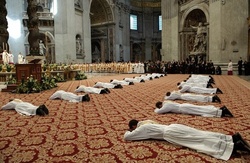 Benedict XVI highlighted the most important points in
the life of a priest: "Your faithfulness in the exercise of the ministry
and the life of prayer, your search for holiness, your total self-giving to God
at the service of your brothers and sisters, as you expend your lives and
energy in order to promote justice, fraternity, solidarity and sharing." (Discourse
to Priests in the Sanctuary of Aparecida, Brasil, 12 May 2007)
Benedict XVI highlighted the most important points in
the life of a priest: "Your faithfulness in the exercise of the ministry
and the life of prayer, your search for holiness, your total self-giving to God
at the service of your brothers and sisters, as you expend your lives and
energy in order to promote justice, fraternity, solidarity and sharing." (Discourse
to Priests in the Sanctuary of Aparecida, Brasil, 12 May 2007)
Catholic priesthood: May 2009 Archives
 Benedict XVI highlighted the most important points in
the life of a priest: "Your faithfulness in the exercise of the ministry
and the life of prayer, your search for holiness, your total self-giving to God
at the service of your brothers and sisters, as you expend your lives and
energy in order to promote justice, fraternity, solidarity and sharing." (Discourse
to Priests in the Sanctuary of Aparecida, Brasil, 12 May 2007)
Benedict XVI highlighted the most important points in
the life of a priest: "Your faithfulness in the exercise of the ministry
and the life of prayer, your search for holiness, your total self-giving to God
at the service of your brothers and sisters, as you expend your lives and
energy in order to promote justice, fraternity, solidarity and sharing." (Discourse
to Priests in the Sanctuary of Aparecida, Brasil, 12 May 2007)
For the most part, the time for priestly diaconal
ordinations have come and gone. Where I am for the summer, a newly ordained
priest is due to arrive in a few days. Having heard plenty of ordination
homilies over the years none are as insightful as Benedict XVI's especially when he proposes a plan to be spiritually fit. Of course, all what is said is not restricted to priests but applicable to the laity as well. All of us
reading this post are familiar with all the points made about developing a
prayer life and seeing them together constitutes a serious plan. Father Mark
draws our attention to one item that is near-and-dear to many of us: lectio divina.
I am re-posting a portion of Father Mark's recent May blog entry because I think it's
helpful.
What is Father Everypriest's daily Rule of Prayer according
to Pope Benedict XVI? Let's consider the elements of the Rule in the order in
which the Holy Father presents them.
1) Daily Holy Mass. Daily. Not 6 days week, not 5, or 4 days
a week, but daily. The liturgical cycle in its hourly, daily, weekly, and
yearly rhythms is given us precisely to facilitate our "abiding" in
Christ hour by hour, day by day, week by week, and year after year. Integral to
the liturgical cycle is daily Holy Mass. The Eucharistic Sacrifice sends the
divine lifeblood coursing through one's spiritual organism. Without daily Mass,
the priest will succumb to spiritual anemia.
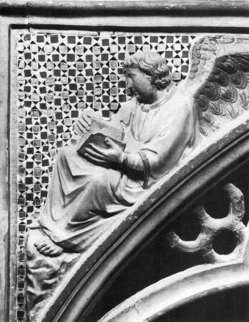
2) The Liturgy of the Hours. The Hours give rhythm and grace
to daily life. They are a school of discipline (discipleship), a supernatural
system of irrigation channeling grace into every moment of the day, a
privileged way of offering thanks in communion with all who, "in heaven,
on earth, and under the earth," confess the Name of Jesus and bend the
knee before Him. A priest who loves the Divine Office will enjoy an interior
life that is sane, and sound, and wholly ecclesial. Fidelity to the Divine
Office refines the Gifts of the Holy Spirit, sharpens one's discernment, and imparts
to everything the priest does a certain Eucharistic and doxological quality.
3) Eucharistic Adoration. Are you surprised? Eucharistic
adoration has known a kind of springtime since The Year of the Eucharist
(2004-2005) that was also the year of the death of Pope John Paul II and of the
election of Pope Benedict XVI. Two Americans known for loving their brother
priests and ministering to them tirelessly -- Archbishop Fulton J. Sheen and
Father Gerald Fitzgerald of the Holy Spirit -- insisted on a daily hour before
the Blessed Sacrament as a sine qua non of priestly spirituality. The priest
who adores the Blessed Sacrament exposes his weaknesses and wounds to the
healing radiance of the Eucharistic Face of Jesus. Moreover, he abides before
the Eucharistic Face of Jesus as the representative of his people: of the sick,
the poor, the bereaved, and of those locked in spiritual combat. The priest who
looks to the Eucharistic Face of Jesus, and draws near to His Open Heart in the
Sacrament of the Altar, will, just as the psalm says, be radiant, and he will
not be put to shame.
4) Lectio Divina. Again -- a monastic thing? No, a Catholic
thing. The quality of a priest's preaching is directly proportionate to his
commitment to lectio divina. Neglect of lectio divina leads to mediocre
preaching. Opening the Scriptures is like opening the tabernacle: therein the
priest finds the "hidden manna" his soul craves. The four steps of lectio
divina can be accommodated to any length of time: 1) lectio, i.e. the Word
heard; 2) meditatio, i.e. the Word repeated; 3) oratio, i.e. the Word prayed;
4) contemplatio; i.e. the indwelling Word. Lectio divina cannot be occasional;
it is not a random pursuit. Learn to say, "I am not available." Get
over feeling guilty about taking time for God!
5) Holy Rosary. Yes, the daily Rosary. It's a spiritual
lifeline that has saved many a priest from spiritual shipwreck. The brilliant
and holy exegete and founder of the École biblique in Jerusalem, Father
Marie-Joseph Lagrange, was observed praying fifteen mysteries of the Rosary
each day, and asked, "Why, Father, do you, a great exegete, need to pray
the Rosary?" "Because, " he answered, "it decapitates
pride." I would add that not only does the Rosary decapitate pride; it
decapitates each of the seven capital sins: pride, greed, lust, anger,
gluttony, envy, and sloth. With the passing of the years I have come to
appreciate the profound wisdom of an old Dominican priest to whom I used to
make my confession years ago. Invariably, after confessing my miseries, Father
would ask, "Do you say the Rosary, son?" And invariably I would
reply, "Yes, Father." And then he would say, "Aye, then you'll
be alright." A priest who prays the Rosary daily will be alright and,
almost imperceptibly, will grow in purity and humility.
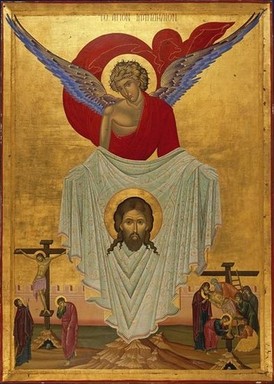
6) Meditation. Meditation can mean many things, even within
our Catholic tradition. It is integral to the prayerful celebration of Holy
Mass and the Hours. "it nourishes Eucharistic adoration. It is the second
"moment" of lectio divina. It is the soul of the Rosary. In my own
experience, meditation is related to "remembering the things the Lord has
done." Saint Gertrude the Great, a model of the mystical life grounded in
the liturgy, used to say, "A grace remembered is a grace renewed."
Understood in this sense, meditation, by recalling the mercies of the Lord in
the past, infuses the present with hope, and allows the priest to go forward
with a holy boldness.
Is it necessary to set a period of time apart for meditation
as such? That depends on whom you ask. The Carmelite, Jesuit and Sulpician
traditions would hold fast to some form of meditation as a daily exercise. The
monastic tradition has, on the whole, taken a more supple approach to
meditation. It is a daily practice, but one diffused in every form of prayer,
including the liturgy itself. One learns to pace one's prayer, to pause, to
breathe, to linger over a phrase, a word, or an image. Whether one espouses the
Ignatian way or the monastic approach, meditation is an integral to every priest's
daily Rule of Prayer.
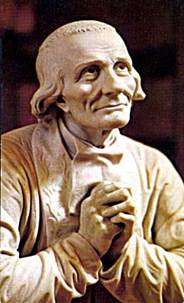
This paragraph from the Pope's homily for the May 3rd priesthood ordinations is a good example of the Pope's holy agenda for priests, indeed, for all who are called to serve the Lord and His Church. As the Pope says, this is dear to his heart...
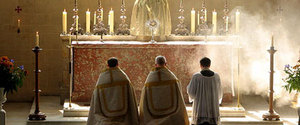 ...prayer
and its ties with service. We have seen that to be ordained priests means to
enter in a sacramental and existential way into Christ's prayer for "his
own". From this we priests derive a particular vocation to pray in a
strongly Christocentric sense: we are called, that is, to "remain"
in Christ as the evangelist John likes to repeat (cf. Jn 1: 35-39; 15:
4-10) and this abiding in Christ is achieved especially through prayer. Our
ministry is totally tied to this "abiding" which is equivalent to
prayer, and draws from this its efficacy. In this perspective, we must
think of the different forms of prayer of a priest, first of all daily Holy
Mass. The Eucharistic Celebration is the greatest and highest act of prayer,
and constitutes the centre and the source from which even the other forms
receive "nourishment": the Liturgy of the Hours,
Eucharistic adoration, Lectio Divina, the Holy Rosary, meditation. All these
expressions of prayer, which have their centre in the Eucharist, fulfill the
words of Jesus in the priest's day and in all his life: "I am the good
shepherd; I know my own and my own know me, as the Father knows me and I know
the Father; and I lay down my life for the sheep" (Jn 10: 14-15). In fact,
this "knowing" and "being known" in Christ and, through
him, in the Most Holy Trinity, is none other than the most true and deep
reality of prayer. The priest who prays a lot, and who prays well,
is progressively drawn out of himself and evermore united to Jesus the Good
Shepherd and the Servant of the Brethren. In conforming to him, even the priest
"gives his life" for the sheep entrusted to him. No one
takes it from him: he offers it himself, in unity with Christ the Lord, who has
the power to give his life and the power to take it back not only for himself,
but also for his friends, bound to him in the Sacrament of Orders. Thus the
life of Christ, Lamb and Shepherd, is communicated to the whole flock, through
the consecrated ministers.
...prayer
and its ties with service. We have seen that to be ordained priests means to
enter in a sacramental and existential way into Christ's prayer for "his
own". From this we priests derive a particular vocation to pray in a
strongly Christocentric sense: we are called, that is, to "remain"
in Christ as the evangelist John likes to repeat (cf. Jn 1: 35-39; 15:
4-10) and this abiding in Christ is achieved especially through prayer. Our
ministry is totally tied to this "abiding" which is equivalent to
prayer, and draws from this its efficacy. In this perspective, we must
think of the different forms of prayer of a priest, first of all daily Holy
Mass. The Eucharistic Celebration is the greatest and highest act of prayer,
and constitutes the centre and the source from which even the other forms
receive "nourishment": the Liturgy of the Hours,
Eucharistic adoration, Lectio Divina, the Holy Rosary, meditation. All these
expressions of prayer, which have their centre in the Eucharist, fulfill the
words of Jesus in the priest's day and in all his life: "I am the good
shepherd; I know my own and my own know me, as the Father knows me and I know
the Father; and I lay down my life for the sheep" (Jn 10: 14-15). In fact,
this "knowing" and "being known" in Christ and, through
him, in the Most Holy Trinity, is none other than the most true and deep
reality of prayer. The priest who prays a lot, and who prays well,
is progressively drawn out of himself and evermore united to Jesus the Good
Shepherd and the Servant of the Brethren. In conforming to him, even the priest
"gives his life" for the sheep entrusted to him. No one
takes it from him: he offers it himself, in unity with Christ the Lord, who has
the power to give his life and the power to take it back not only for himself,
but also for his friends, bound to him in the Sacrament of Orders. Thus the
life of Christ, Lamb and Shepherd, is communicated to the whole flock, through
the consecrated ministers.
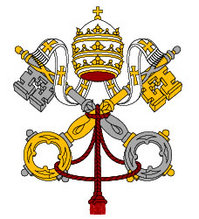
Today, James Cardinal Stafford, the Major Apostolic Penitentiary (or visit this link) announced that during the Year for Priests, June 19, 2009 - June 19, 2010, the Pope Benedict will grant plenary indulgences to priests and the faithful.
The year will begin on the Solemnity of the Sacred Heart of Jesus, "a day of priestly sanctification," when the Holy Father "will celebrate Vespers before relics" of Saint John Mary Vianney, patron saint of priests.
In recent years
we've been blessed with many favors granted through the pious work of Pope
Benedict. I, for one, am grateful to receive the Pope's solicitude for my
destiny, for my soul. Why am I happy? I am happy about this because I happen to
think the Pope is a man who enjoys a deep communion with the Lord and he is
guided by the Holy Spirit. His spiritual paternity is one that connects with my
desires to be a man prayer grounded in my desires for communion with God and
neighbor. I don't want to be controlled by sin; I don't want to be a sinner all
my life; I don't want to be ungrateful for the gifts I've received from the
Lord: life, parents and family, friends and colleagues, humor and intellect,
desire and faith, etc. Life is not easy. Christian living is even tougher some
days and I know what I am capable of and what I am not. Two favorite scripture
passages that focus my attention in daily living are: "O God, be merciful to me
a sinner" and "Lord, I believe, help my unbelief."
What is distressing about some of the criticism about indulgences is the ignorance of intelligent Catholics. There is a group of people who lack understanding of a sense of grace and mediation of the Church for our salvation are highly skeptical about the resurgence of talk on indulgences. You ask what is an indulgence and why are we speaking about indulgences again. In short, the point of an indulgence is that it "intends as its primary aim to stimulate the faithful in their fervor of charity, and thereby in the worthy reception of the Sacraments and the carrying out of the works of mercy and penance." More information can be gained by reading the article at this link.
The means to obtain the indulgence, this favor, are as follows:
(A) All truly penitent priests who, on any day, devotedly pray Lauds or Vespers before the Blessed Sacrament exposed to public adoration or in the tabernacle, and ... offer themselves with a ready and generous heart for the celebration of the Sacraments, especially the Sacrament of Penance, will be granted a Plenary Indulgence, which they can also apply to their deceased confreres, if in accordance with current norms they take Sacramental Confession and the Eucharist and pray in accordance with the intentions of the Supreme Pontiff. Priests are furthermore granted a Partial Indulgence, also applicable to deceased confreres, every time they devotedly recite the prayers duly approved to lead a saintly life and to carry out the duties entrusted to them.
(B) All truly penitent Christian faithful who, in church or oratory, devotedly attend Holy Mass and offer prayers to Jesus Christ, supreme and eternal Priest, for the priests of the Church, or perform any good work to sanctify and mold them to His Heart, are granted a Plenary Indulgence, on the condition that they have expiated their sins through Sacramental Confession and prayed in accordance with the intentions of the Supreme Pontiff. This may be done on the opening and closing days of the Year of Priests, on the 150th anniversary of the death of Saint John Mary Vianney, on the first Thursday of the month, or on any other day established by the ordinaries of particular places for the good of the faithful.
The elderly, the sick and all those who for any legitimate reason are unable to leave their homes, may still obtain a plenary indulgence if, with the soul completely removed from attachment to any form of sin and with the intention of observing, as soon as they can, the usual three conditions, "on the days concerned, they pray for the sanctification of priests and offer their sickness and suffering to God through Mary, Queen of the Apostles."
A partial indulgence will be offered to the faithful each time they pray five "Our Father," "Hail Mary," and "Glory Be," or any other duly approved prayer "in honor of the Sacred Heart of Jesus to ask that priests maintain purity and sanctity of life."
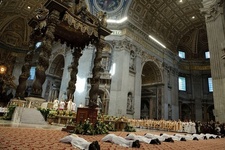
Bishop William Lori ordained two men to the diaconate today; they'll be ordained priests next year. Saturday, May 16, the Bishop ordains six men to the priesthood. These are happy days for the diocese of Bridgeport. So, I was thinking about the priesthood and what it means. While there are vast amounts of literature on nature of the priesthood, I thought Saint John Vianney would be an appropriate sounding board for today.
The priest is not a priest for himself; he does not give himself absolution; he does not administer the Sacraments to himself. He is not for himself, he is for you. After God, the priest is everything. Leave a parish twenty years without priests; they will worship beasts. If the missionary Father and I were to go away, you would say, "What can we do in this church? there is no Mass; Our Lord is not longer there: we may as well pray at home." When people wish to destroy religion, they begin by attacking the priest, because where there is no longer any priest there is no sacrifice, and where there is no longer any sacrifice there is no religion.
Saint John-Mary Vianney, The Little Catechism of the Cure of Ars

